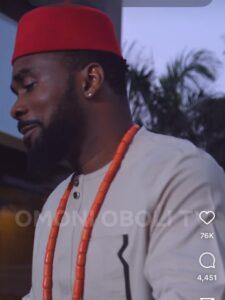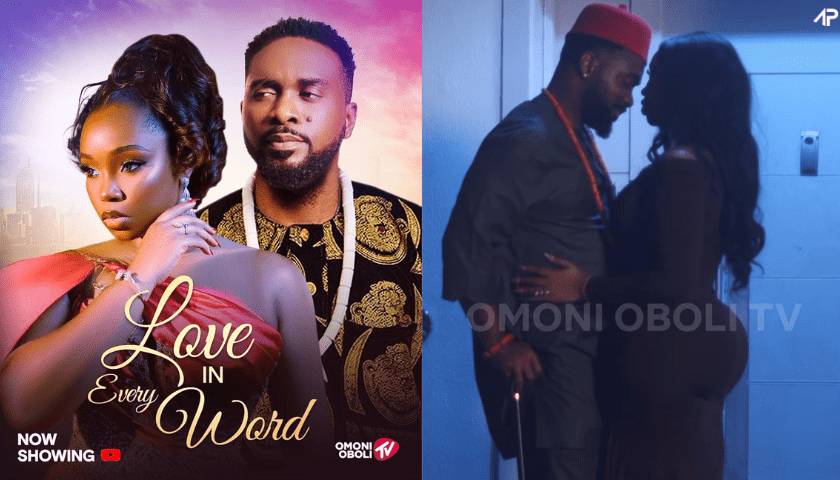Movie Review On “Love In Every Word” The Interesting, Intrigues, And The Lessons it Taught.
“Love In Every Word,” produced by Omoni Oboli, is a Nollywood film that explores the complexities of love, self-respect, and cultural identity.
The story revolves around two main characters: Odogwu, played by Uzor Arukwe, and Chioma, portrayed by Bamike ‘Bam Bam’ Olawunmi-Adenibuyan.
Their journey reflects modern relationships, infused with themes of ambition, integrity, and the importance of personal values. Just before you continue, here’s a quick synopsis of the storyline:
While you’re here, check out these universities offering Visa Sponsorship in the United Kingdom.
Story Line

This film, which Mfon-Abasi Michael Inyang wrote, is a masterfully composed story of love. Two people from separate cultures meet unexpectedly in Lagos.
They have to confront their worries and negotiate social expectations as feelings rise and cultural differences become more significant.
They must choose whether to jump at the chance for something genuine or allow their differences to drive them apart.
Positive Aspects
-
Strong Character Development

Odogwu’s Integrity: Odogwu is portrayed as a man of honor and intention. From their first encounter, he is clear about his desire to marry Chioma, which sets the tone for an honest relationship.
Unlike typical romantic leads, he does not engage in emotional manipulation or “green lights” signals. His straightforwardness is refreshing and challenges the prevalent dynamic seen in romantic narratives.
Chioma’s Independence: Chioma is a standout character who embodies strength and self-awareness. She is not easily swayed by Odogwu’s wealth. Instead, her past experiences have taught her the importance of self-reliance.
This portrayal of a woman who values her independence is both timely and empowering, showcasing that love should not come at the expense of personal goals.
-
Engaging Plot and Themes
Intentional Love: The film effectively communicates the concept of intentional love—where both partners are clear about their intentions and respect each other’s boundaries.
This is shown in Odogwu’s approach when Chioma initially declines his advances. He respects her decision without resentment or pressure.
Cultural Pride: The film celebrates cultural identity, particularly through the characters’ embrace of their Igbo heritage. Odogwu’s refusal to alter his accent for acceptance is a powerful statement about authenticity and self-acceptance.
-
Humor and Relatability

The film is infused with humor, making it an enjoyable watch. The interactions between characters are often light-hearted, which helps to balance the more serious themes.
The comic elements are relatable, which allows viewers to connect with the characters on a personal level.
Chioma’s friendships provide comic relief and support. Her friends play a crucial role in her decision-making, emphasizing the importance of having a solid support system.
The way they rally around her during challenging moments adds depth to the narrative. The role of good friends was perfectly met.
-
Cinematic Quality
The cinematography captures Lagos which showcase the hub of wealthy men. The visually appealing scenes enhance the storytelling, making it more immersive for the audience.
Additionally, the music complements the film’s emotional tone, with a soundtrack that resonates well with the themes of love and self-discovery.
The songs are carefully selected to elevate key moments, adding to the overall experience.
-
Life Lessons
The film imparts valuable lessons on relationships, self-respect, and the importance of being true to oneself. Chioma’s journey teaches viewers that love should be given freely and without pressure.
The idea that demanding love diminishes its value is a poignant message that resonates throughout the film.
Negative Aspects
-
Pacing Issues

The character development is commendable. However, the film suffers from pacing problems. Certain scenes linger longer than necessary, which can disrupt the flow of the narrative.
This uneven pacing may lead to moments where audience engagement wanes, particularly in the middle sections of the film.
-
Simplistic Resolutions
Some of the conflicts presented in the film are resolved too easily, which can feel unrealistic. The simplicity of these resolutions may leave viewers wanting more depth in the characters.
For example, while Chioma faces challenges, her solutions often come about without the struggle that real-life situations demand. This could undermine the emotional impact of her journey.
-
Underdeveloped Secondary Characters
While the main characters are well-rounded, some secondary characters lack depth and development.
Their motivations and backgrounds are not fully explored, making them feel like mere plot devices rather than integral parts of the story.
This can detract from the richness of the narrative and leave audiences wanting more insight into these characters.
-
Cultural Stereotypes
Despite its efforts to challenge stereotypes, the film sometimes reinforces certain cultural narratives. Odogwu is portrayed as supportive of Chioma’s ambitions.
Still, there are moments where traditional gender expectations are hinted at, which could be perceived as contradictory to the film’s progressive messages.
The Summary
The film shines in its character development, particularly with Odogwu and Chioma, who represent modern ideals of love and independence.
However, it has pacing issues and some underdeveloped characters, and the overall message of authenticity and self-respect resonates strongly.
I assume you have seen this movie or have yet to, but I think you should go see the movie and then come back and drop your rate in the comment section. All in all, we give it an 8/10 sounding rate, thanks for reading!



One comment